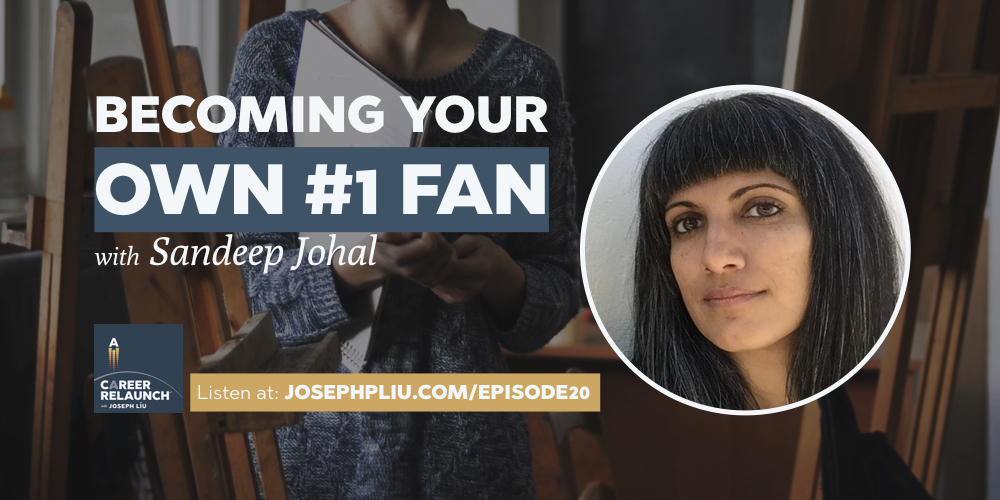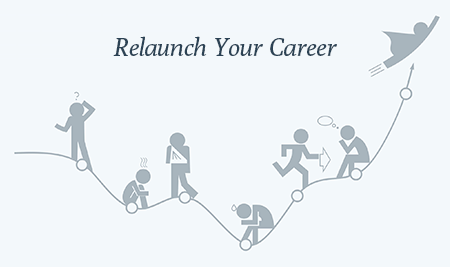As someone who left the corporate world to start my own business a few years ago, I’ve had my fair share of dealing with imposter syndrome, not only hearing many stories of my clients’ struggles with this as they change careers, but also (and especially), managing my own struggles with feeling like a fraud at times whenever I’ve ventured off to do something new in my own career.
In a nutshell, “Imposter Syndrome” is all about not feeling confident about your accomplishments, skills, or capabilities, especially when you’re setting off to do something new in your career or life. The term was first coined by clinical psychologists Pauline Clance and Suzanne Imes, who described individuals who had a persistent fear of being exposed as a “fraud.”
In my own career, I’ve especially felt this when I’ve set off to do something new in my career, whether leaving the safety of the corporate world to start my own business, to get up in front of an audience at a conference to deliver a keynote talk, or to launch my own career podcast.
During my own journey, I’ve found a few resources to be especially clarifying and helpful in my efforts to believe in myself and take some brave actions that ultimately served me well and allowed me to do more work that I found truly meaningful.
Here are five resources I hope can also help you if you’re questioning your own abilities.
Amy Cuddy’s TED Talk: Your body language may shape who you are
I watched this talk by Amy Cuddy a year after she delivered it, which coincided with my decision to leave my corporate marketing job behind to launch my own career consultancy. At the time, I’d just obtained my coaching certification and was wrestling with how to position myself as a personal branding “expert” and speaker.
Watching this talk helped me shift my mindset from “fake it till you make it” to “fake it till you become it,” something Cuddy describes so eloquently in her talk. More specifically, it helped me realize that my body could become a tool I use to create the confidence I need to convey whenever I deliver a proposal, coach clients, get up in front of an audience to give a talk, and even to do something as simple as tell people “what I do” for a living in a social setting.
Since watching this talk, I do my best to stand confidently before I go up in front of audiences, not necessarily because I feel confident, but because I know it helps me feel confident and act confidently.
Tony Robbins: The Power of Belief
Some of my clients love him, others don’t, but for me personally, I find many of the concepts that celebrity life coach Tony Robbins shares to be very relevant and actionable in my own career and life. I stumbled across this video as I was struggling to believe in myself and my own potential when I was just starting off as a business owner. I wondered what impact I could deliver to my audiences full of accomplished professionals. I wondered if I had amassed enough professional, corporate experience to be coaching credible clients. I also wondered if the value I was providing justified the fees I was attempting to charge.
In this video, Tony Robbins’ guests Frank Kern and John Reese are focused on the material, monetary side of their achievements, which kinda rubbed me the wrong way, but when I put that aside and focused on the principle they’re talking about here, which is all about believing in yourself, I found this idea to be a game-changer in my own career. I realized that my ability to achieve the results I wanted in my career–to launch my podcast, to thrive both personally and financially as a business owner, or to create the impact I wanted with my clients–started with my believing in my own abilities to achieve those results.
Before watching this video, I thought I needed to exercise a skill before feeling confident in that skill. Now, I do whatever I can to first feel confident in that skill so I can successfully exercise that skill. For example, I used to think I needed to give a successful talk before I could believe in my speaking abilities. I now realize I need to push myself to first believe I am an effective speaker so my own psychology can be where it needs to be so I can give a successful talk. I’m not always perfect at it, but having this mindset has made a huge difference.
How I Stopped Feeling Like a Fraud- Fast Company
Companionship can be incredibly comforting when you’re struggling with a challenge in your career. Just knowing someone else has gone through what you’re feeling can be affirming and confidence-building. Sometimes, hearing how others have dealt with imposter syndrome.
In this article I wrote for Fast Company, I share my own struggles with imposter syndrome, the 3 steps I take to overcome it, and what steps I’ve taken to manage my own self confidence. This article was my own post-mortem during year 4 of starting my own business, and I hope the lessons I learned can help you too.
Guy Ferdman’s Future-Self Mindset
“Who we are in the present moment is a function of the future we’re expecting. So what are the actions I can take right now that can be consistent with that future I’m expecting?”
Hearing this was a game-changer for me. It really helped me understand that I needed to behave in a way that’s similar to who I want to become, not who I’ve been. This mindset has helped me stay resilient and keep pushing my business to the next level rather than playing it safe. Whenever I’ve been scared to pursue an idea or been dealt a major rejection, I try to react in a way I would if my business had already reached that point I’m trying to achieve. I try not to let my past dictate who I can become or what my business can become.
Career Relaunch Podcast Episodes on Managing Self-Doubt
One of the great privileges I have in my line of work is to hear the personal stories of people who have wrestled with big pivot points in their careers, which has taught me so much about which actions and productive or unproductive when trying to open up new doors in your career. In addition to my private client work, I’ve interviewed over 40 people featured on my Career Relaunch podcast. I created this series to help my clients understand the common struggles other people go through when they’re trying to relaunch their careers. However, these conversations have also helped me.
In this discussion I had with aspiring artist Sandeep Johal, she talks about this concept of being “your own biggest fan,” which I found really useful and relevant to my own work. For so long, I wondered if my podcast was having any impact or making any real difference, but Sandeep’s philosophy actually helped me realize that I needed to be a fan of my own work before I could really promote my work to others.

Additionally, the very first interview I recorded for Career Relaunch was with Anne Tumlinson, a health policy guru and founder of Daughterhood who’s mission is to support and build confidence in women who are caring for aging parents. She talks about how she overcame her own struggles with imposter syndrome, and how you just have to start somewhere when you’re trying to create a new opportunity in your career. Her words really reminded me that I should always try to take small micro-actions, even if I don’t feel ready to take big steps or can’t map out precisely where I’m going. This relates to the concept of the “20-Mile March” that Jim Collins talks about in his book Great by Choice–taking consistent actions every single day, no matter how small, to eventually get you where you want to go.
You Absolutely Can Manage Imposter Syndrome
As you can see, imposter syndrome is a real struggle that’s not uncommon amongst aspiring business owners and career changers. If you’re feeling like a fraud when venturing off to do something new, rest assured, you’re not alone. I still struggle with it myself, but I hope these resources can help you as much as they’ve helped me.





